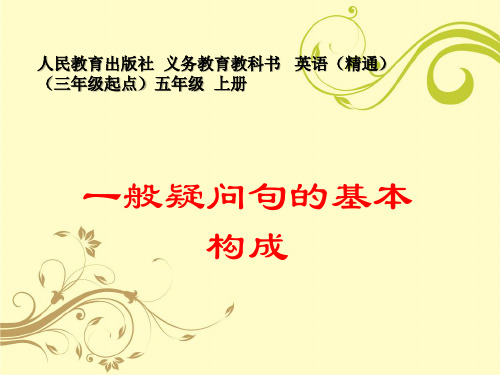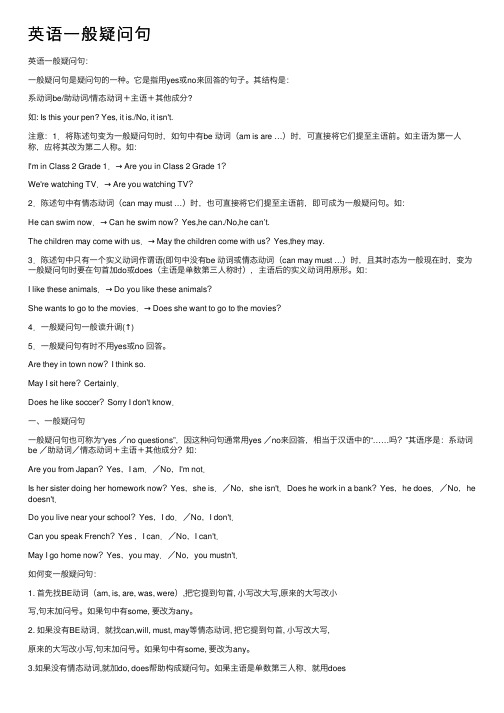一般疑问句变化 实义动词
一般现在时实意动词

Her friends go shopping. Mary goes shopping.
Jane reads books. The students read books.
二. 哪些主语 是第三人称单
数
1.人称代词he, she, it是第三人称 单数.
1).He likes watching TV. 他喜欢看电视.
2).Beijing is in China. 北京在中 国.
3). Miss Wu often makes cakes.王叔叔经常做蛋糕.
3.单数可数名词或 “this/that/the + 单数可数名词”
作主语时,是第三人称单数. 如: 1).This girl plays football in school.
• 13. My father always __________(come) back(回来) from work very late.
• 14. The teacher is busy. He __________ (sleep睡觉) six hours a day.
• 15. Joan __________(sing唱歌) in the classroom every day. She often __________ (sing) there.
2).She has lunch at twelve. 他十二点吃午餐.
3). It looks like a cat. 它看起来象只猫.
2. 单个人名.地名或称呼作主语时, 是第三人称单数形式.如:
1).Han Mei watches TV with her mother.韩梅和她的母亲看电 视.
2.2.We like MaW the. don’ t like Moths.
一般疑问句改写练习(助动词)

一般疑问句改写练习(助动词)一、改写规则肯定句改为一般疑问句,没有be动词也没有情态动词的,引入助动词(do、does、did)放句首,其后动词用原型;第一人称变第二人称;some变any。
本篇重点讲解含有实义动词的情况,下面通过几个例子来了解下。
二、举例分析1. I play basketball very well.(改为一般疑问句)分析:题中没有be动词也没有情态动词,有实义动词(play),故引入助动词do或does,由于I是第一人称,只有当主语是第三人称单数的时候采用does,所以用助动词do;第一人称(I)变第二人称(you),直接改为:Do you play basketball very well?2.My father likes going swimming.(改为一般疑问句)分析:题中没有be动词也没有情态动词,有实义动词(like),故引入助动词do或does,由于my father是第三人称单数,所以用助动词does;第一人称(my)变成第二人称(your),紧随其后的动词用原形(likes-like),故改为:Does your father like going swimming?3.Tom had some milk yesterday morning.(改为一般疑问句)分析:题中没有be动词也没有情态动词,有实义动词had (have过去式),是一般过去时态,故引入助动词did; some 变any,故改为:Did Tom have any milk yesterday morning?三、巩固练习1.We often talk about our hobbies.(改为一般疑问句)2.I like running and jumping.(改为一般疑问句)3.She comes back home at 6 pm .(改为一般疑问句)4.Daniel has lots of homework.(改为一般疑问句)5.Lily and I go to school on foot.(改为一般疑问句)6.We all have a good time today.(改为一般疑问句)7.His teacher always reads stories in class.(改为一般疑问句)8.I went to Nanjing with my brother last week.(改为一般疑问句)9.He always reads books before bedtime.(改为一般疑问句)10.My uncle teaches English in our school.(改为一般疑问句)11.Lily went to hospital to look after her grandfather last Sunday.(改为一般疑问句)12.Tim’s brother seldom goes shopping with us.(改为一般疑问句)13.The little dog lost its way.(改为一般疑问句)14.We bought some gifts for our teachers. (改为一般疑问句)15.They love going swimming very much.(改为一般疑问句)16.His mum often brings nice sweets for us.(改为一般疑问句)17.The kite flies high in the sky.(改为一般疑问句)18.All of us saw that strange man in our school.(改为一般疑问句)19.Bob and I got the same points.(改为一般疑问句)20.I usually have breakfast at 7o’clock in the morning.(改为一般疑问句)21.She does her homework carefully.(改为一般疑问句)。
一般疑问句的基本构成

e.g: The children may come with us.
也许孩子们会跟我们来。
→May the children come with us?
孩子们会跟我们来吗?
I can spell it. 我会拼写它。 →Can you spell it? 你会拼写它吗?
3.含实义动词的一般疑问句构成
陈述句中只有一个实义动词作谓语,且其时 态为一般现在时,变为一般疑问句时要在句首 加do或does。其中does仅用于主语为第三人称 单数的句子,其后的实义动词改用原形。
注意:如遇第一人称,将其置换成第二人称。
e.g: She lives in Beijing. 她住在北京。
e.g: I'm fine,thank you.And you ?
我很好,谢谢!你呢?
I live in Beijing now.How about you ?
我现在住在北京,你呢?
一般疑问句的语调
大部分的一般疑问句都应读作升调(↗) ,并落在最后一个单词身上。
e.g: Is it a Chinese car↗?
那是一辆中国车吗?
一般疑问句的应答 用yes / no(或相当于yes / no的词)回答,并怎么问怎么答( 句首为is / are,情态动词还是do /does),简略回答时要注意缩 写(否定的n't)和采用相应的人称代词以避免重复。即:
Yes,主语(代词)+am / is / are或情态动词或do / does.表示肯定 ;
I'm in Class 2 Grade 1.我在一年级二班。 → Are you in Class 2 Grade 1?
英语一般疑问句

英语⼀般疑问句英语⼀般疑问句:⼀般疑问句是疑问句的⼀种。
它是指⽤yes或no来回答的句⼦。
其结构是:系动词be/助动词/情态动词+主语+其他成分?如: Is this your pen? Yes, it is./No, it isn't.注意:1.将陈述句变为⼀般疑问句时,如句中有be 动词(am is are …)时,可直接将它们提⾄主语前。
如主语为第⼀⼈称,应将其改为第⼆⼈称。
如:I'm in Class 2 Grade 1.→ Are you in Class 2 Grade 1?We're watching TV.→ Are you watching TV?2.陈述句中有情态动词(can may must …)时,也可直接将它们提⾄主语前,即可成为⼀般疑问句。
如:He can swim now.→ Can he swim now?Yes,he can./No,he can’t.The children may come with us.→ May the children come with us?Yes,they may.3.陈述句中只有⼀个实义动词作谓语(即句中没有be 动词或情态动词(can may must …)时,且其时态为⼀般现在时,变为⼀般疑问句时要在句⾸加do或does(主语是单数第三⼈称时),主语后的实义动词⽤原形。
如:I like these animals.→ Do you like these animals?She wants to go to the movies.→ Does she want to go to the movies?4.⼀般疑问句⼀般读升调(↑)5.⼀般疑问句有时不⽤yes或no 回答。
Are they in town now?I think so.May I sit here?Certainly.Does he like soccer?Sorry I don't know.⼀、⼀般疑问句⼀般疑问句也可称为“yes /no questions”,因这种问句通常⽤yes /no来回答,相当于汉语中的“……吗?”其语序是:系动词be /助动词/情态动词+主语+其他成分?如:Are you from Japan?Yes,I am./No,I'm not.Is her sister doing her homework now?Yes,she is./No,she isn't.Does he work in a bank?Yes,he does./No,he doesn't.Do you live near your school?Yes,I do./No,I don't.Can you speak French?Yes ,I can./No,I can't.May I go home now?Yes,you may./No,you mustn't.如何变⼀般疑问句:1. ⾸先找BE动词(am, is, are, was, were),把它提到句⾸, ⼩写改⼤写,原来的⼤写改⼩写,句末加问号。
一般疑问句的几种类型

一.一般现在时定义:一般现在时表示现在经常或反复发生的动作、存在的状态的时态.用法:1) 经常性或习惯性的动作 ,如:I do my homework in the evening。
We often have lunch at school.I am a student.2)客观真理,客观存在,科学事实。
The earth moves around the sun.地球围绕太阳转。
Shanghai lies in the east of China.上海位于中国东部。
构成:1) 含有be动词的一般现在时的构成肯定句:主语 + be(am, is, are ) + 其他否定句:主语 + be(am, is, are ) +not + 其他疑问句:be(am, is, are ) +主语 + 其他如:We are students。
We are not students.Are we students?2) 含有实义动词的一般现在时的够成肯定句:主语+ 实义动词 + 其他否定句:主语 + don’t/doesn’t +动词原形 + 其他疑问句:Do/Does + 主语 + 动词原形 + 其他如:I go to school in the morning。
We don't go to school on Sunday。
Does she go to work on Sunday?提示词:every morning/night/evening/day/week, Often, sometimes,always, usually, regularly,二.第三人称单数式在一般现在时中,当主语是第三人称单数时,谓语动词需要变化,动词的变化形式就叫做第三人称单数式。
变化规律如下:1. 一般情况下,直接在动词词尾+s ,例如:get-—— gets; take→takes2。
以s, x, ch, sh,结尾的动词,在词尾+ es,例如:teach→ teaches; fix→fixes; finish-———finishes; cross—-—crosses。
实义动词的否定句和疑问句句式变化及动词的第三人称变化规律

动词第三人称单数形式构成规则及练习题动词第三人称单数形式构成规则1、大多数动词在词尾加“S”在清辅音后发音为[s],在浊辅音及元音后发音为[z]。
如:①stop-stops [s] ; make-makes [s]②read-reads [z] ; play-plays [z]2、以辅音字母加“y”结尾的,要先将“y”变为“i”,然后在加“es”读[iz] 如:fly-flies [z];carry-carries [z]study-studies [z]; worry-worries3、以“s, x, ch, sh”结尾的,在词尾加“es”,发音为[iz] 如:teach-teaches [iz]; watch-watches [iz]4、以“o”结尾的动词,加“es”,读[z] 如:go-goes [z] do-does [z下面几个动词变为单数时,原词的元音部分的发音发生了较大的变化,请注意记忆。
如: 1、do [du:]-does [dz]2、say [sei]-says [sez]以不发音字母“e”结尾的开音节词,如果尾音是[s],[z]时,加“s”后字母“e”发音,与所加“s”一起读做[iz]。
如:close-closes [iz]be动词包括:am,is,are。
第三人称单数用is;过去式为was;复数用are,过去式为were.注意:动词have ,遇到主语是第三人称单数时,要用has;动词be 的第三人称单数形式是is。
含have和has的肯定句变否定句和疑问句。
并做出肯定回答和否定回答I have an apple.I don’t have an apple.(否定句在have前加not)Do you have an apple (疑问句用do提问,句首第一个字母大写,句尾加问号)Yes, I do./ No, I don’t.(用do和don’t回答,)He has a big nose.、He doesn’t have a big nose.(否定句在has前加doesn’t ,并把has变成have) Does he have a big nose(疑问句用does提问,并把has变成have)Yes , he does./ No, he doesn’t.(用does和doesn’t回答)一般现在时中的第三人称单数形式在一般现在时中,当主语是第三人称单数时,谓语动词要用第三人称单数形式,即常在动词原形后加-s或-es。
实义动词的否定句和疑问句句式变化及动词的第三人称变化规律
动词第三人称单数形式构成规则及练习题动词第三人称单数形式构成规则1、大多数动词在词尾加“S”在清辅音后发音为[s],在浊辅音及元音后发音为[z]。
如:①stop-stops [s] ; make-makes [s]②read-reads [z] ; play-plays [z]2、以辅音字母加“y”结尾的,要先将“y”变为“i”,然后在加“es”读[iz] 如:fly-flies [z]; carry-carries [z]study-studies [z]; worry-worries3、以“s, x, ch, sh”结尾的,在词尾加“es”,发音为[iz] 如:teach-teaches [iz]; watch-watches [iz]4、以“o”结尾的动词,加“es”,读[z] 如:go-goes [z] do-does [z下面几个动词变为单数时,原词的元音部分的发音发生了较大的变化,请注意记忆。
如: 1、do [du:]-does [dz]2、say [sei]-says [sez]以不发音字母“e”结尾的开音节词,如果尾音是[s],[z]时,加“s”后字母“e”发音,与所加“s”一起读做[iz]。
如: close-closes [iz]be动词包括:am, is, are。
第三人称单数用 is;过去式为 was;复数用are,过去式为were.注意:动词 have ,遇到主语是第三人称单数时,要用 has;动词 be 的第三人称单数形式是is。
含have和has的肯定句变否定句和疑问句。
并做出肯定回答和否定回答I have an apple.I don’t have an apple.(否定句在have前加not)Do you have an apple? (疑问句用do提问,句首第一个字母大写,句尾加问号)Yes, I do./ No, I don’t.(用do和don’t回答,)He has a big nose.He doesn’t have a big nose.(否定句在has前加doesn’t,并把has变成have) Does he have a big nose?(疑问句用does提问,并把has变成have)Yes , he does./ No, he doesn’t.(用does和doesn’t回答)一般现在时中的第三人称单数形式在一般现在时中,当主语是第三人称单数时,谓语动词要用第三人称单数形式,即常在动词原形后加-s或-es。
一般现在时be动词和实义动词的句型转换练习
句型转换1. I am a happy girl.否定句:_________________________________________一般疑问句:_____________________________________ 肯、否定回答:__________________________________2. This is my book.否定句:___________________________________________ 一般疑问句:_______________________________________ 肯、否定回答:_____________________________________ 3. They are on the chair.否定句:________________________________________一般疑问句:____________________________________ 肯、否定回答:__________________________________4. There is a bird in the sky .否定句:________________________________________一般疑问句:____________________________________ 肯、否定回答:__________________________________5. Bob is playing the piano.否定句:________________________________________一般疑问句: ____________________________________ 肯、否定回答: __________________________________ 6. Those are my books.否定句: _________________________________________ 一般疑问句: _____________________________________ 肯、否定回答: __________________________________变单数: _________________________________________7. They like play ing basketball.否定句: _________________________________________ 一般疑问句: _____________________________________ 肯、否定回答: __________________________________划线部分提问: _____________________________________ 8. We study En glish well..否定句: ___________________________________________ 一般疑问句: _______________________________________ 肯、否定回答: _____________________________________ 9. Lily has a black ball.否定句: ________________________________________一般疑问句: ____________________________________ 肯、否定回答: __________________________________划线部分提问: _____________________________________ 资料收集于网络,如有侵权请联系网站删除10. Tom and Tony play basketball after school.否定句: ________________________________________一般疑问句: ____________________________________肯、否定回答: _______________________________ 划线部分提问: 11. I want to eat some bread.否定句: ________________________________________一般疑问句: ____________________________________肯、否定回答: __________________________________划线部分提问: _____________________________________8. My frie nds likes apples.否定句: ________________________________________一般疑问句: ____________________________________肯、否定回答: __________________________________划线部分提问: _____________________________________。
实义动词的否定句和疑问句句式变化及动词的第三人称变化规律
实义动词的否定句和疑问句句式变化及动词的第三人称变化规律动词第三人称单数形式构成规则及练习题动词第三人称单数形式构成规则1、大多数动词在词尾加“S”在清辅音后发音为[s],在浊辅音及元音后发音为[z]。
如:①stop-stops [s] ; make-makes [s]②read-reads [z] ; play-plays [z]2、以辅音字母加“y”结尾的,要先将“y”变为“i”,然后在加“es”读[iz] 如:fly-flies [z]; carry-carries [z]study-studies [z]; worry-worries3、以“s, x, ch, sh”结尾的,在词尾加“es”,发音为[iz] 如:teach-teaches [iz]; watch-watches [iz]4、以“o”结尾的动词,加“es”,读[z] 如:go-goes [z] do-does [z下面几个动词变为单数时,原词的元音部分的发音发生了较大的变化,请注意记忆。
如: 1、do [du:]-does [dz]2、say [sei]-says [sez]以不发音字母“e”结尾的开音节词,如果尾音是[s],[z]时,加“s”后字母“e”发音,与所加“s”一起读做[iz]。
如:close-closes [iz]be动词包括:am, is, are。
第三人称单数用 is;过去式为 was;复数用are,过去式为were.注意:动词 have ,遇到主语是第三人称单数时,要用 has;动词be 的第三人称单数形式是is。
含have和has的肯定句变否定句和疑问句。
并做出肯定回答和否定回答I have an apple.I don’t have an apple.(否定句在have前加not)Do you have an apple? (疑问句用do提问,句首第一个字母大写,句尾加问号)Yes, I do./ No, I don’t.(用do和don’t回答,)He has a big nose.He doesn’t have a big nose.(否定句在has前加doesn’t,并把has变成have) Does he have a big nose?(疑问句用does提问,并把has变成have)Yes , he does./ No, he doesn’t.(用does和doesn’t回答)一般现在时中的第三人称单数形式在一般现在时中,当主语是第三人称单数时,谓语动词要用第三人称单数形式,即常在动词原形后加-s或-es。
实义动词一般疑问句
实义动词一般疑问句1.实义动词(行为动词):有实际意义,表示实际动作的动词。
2.肯定句:主语(第三人称单数)+行为动词(三单)+名词第三人称单数:she,he,it ,名词单数,人名,不及物动词例如:I have a pen. He has a pen.3.否定句:主语(第三人称单数)+don't (doesn')+行为动词+名词例如:I don't have a pen. He doesn'thave a pen.4.一般疑问句:Do (Does)+主语(第三人称单数)+行为动词+名词例如:Do you have a pen? Does he have a pen?5.肯否回答:Yes,主语+do (does)No,主语+do n't (doesn't)例如:Yes,I do./No, I don't. Yes, he does./No, hedoesn't.6.do,does 称为助动词,无实际意义例如:1.肯定句:I have a pencil.否定句:I don't have a pencil.一般疑问句:Do you have a pencil?肯否回答:Yes,I do. No, I don't.2.肯定句:She has a schoolbag.否定句:She doesn'thave a schoolbag.一般疑问句:Does she have a schoolbag?肯否回答:Yes, she does. No, she doesn't.练习:1.我有一个飞机模型。
肯定句:______________________________________否定句:______________________________________一般疑问句:____________________________________肯否回答:______________________________________2.他有一个书架。
- 1、下载文档前请自行甄别文档内容的完整性,平台不提供额外的编辑、内容补充、找答案等附加服务。
- 2、"仅部分预览"的文档,不可在线预览部分如存在完整性等问题,可反馈申请退款(可完整预览的文档不适用该条件!)。
- 3、如文档侵犯您的权益,请联系客服反馈,我们会尽快为您处理(人工客服工作时间:9:00-18:30)。
6. She brings the photo to school. 一般疑问句: Does she bring the photo to school? Yes, she does. No, she doesn’t. 否定句: She doesn’t bring the photo to school.
7. Does he eat potatoes? Is Do 8. Are they meet their friend? 9. My younger brother and I have six math classes. has 10. Does the cat have four has legs? Yes, theitcat does.
作业
把下列句子变成一般 疑问句,作肯否定回 答。并变成否定句。
1. He takes the key to Mr. Li. 2. Mrs. Green likes soccer. 3. Miss Liu watches TV every day. 4. You have a green pen. 5. I have an orange coat. 6. He has a nice bedroom.
2. We like music very much. 一般疑问句: Do you like music very much? Yes, we do. No, we don’t. 否定句: We don’t like music very much.
3. They play basketball every afternoon. 一般疑问句: Do they play basketball every afternoon? Yes, they do. No, they don’t. 否定句: They don’t play basketball every afternoon.
1. 谓语是实义动词的句子, 其否定句变法: 1) 主语 + don’t + 谓语动词. 2) 主语(三单) + doesn’t +谓 语动词原形.
重点讲解与练习
把下列句子变成一般 疑问句,作肯否定回 答。并变成否定句。
1. I watch TV every evening. 一般疑问句: Do you watch TV every evening? Yes, I do. No, I don’t. 否定句: I don’t watch TV every evening.
Key structures
1. 谓语是实义动词的句子, 其一般疑问句变法: 1) Do + 主语 + 谓语动词…? Yes, I/we/you/they do. No, I/we/you/they don’t.
2) Does + 主语(三单) + 谓语 动词原形…? Yes, he/she/it does. No, he/she/it doesn’t.
4. You have a green pen.
Do you have a green pen? Yes, I do. No, I don’t. You don’t have a green pen.
5. I have an orange coat. Do you have an orange coat? Yes, I do. No, I don’t. I don’t have an orange coat.
6. He has a nice bedroom. Does he have a nice bedroom? Yes, he does. No, he doesn’t. He doesn’t have a nice bedroom.
改错
把下列句子错误找出, 并写出正确的句子。
1. He doesn’t likes potatoes. 2. We don’t watches TV. 3. Does Lily plays soccer? 4. Do Lily and Lucy has have an alarm clock. 5. The teacher lets us play. 6. I am like eating tomatoes.
4. He likes English.
一般疑问句:
Does he like English? Yes, he does. No, he doesn’t.
否定句:
He doesn’t like English.
5. Kim knows Chinese.
一般疑问句:
Does Kim know Chinese? Yes, she does. No, she doesn’t.
用所给动词的适当形式
填空
needs 1. He _____(need) a hat. meets 2. Sally_____ (meet) her friend. 3. Ed has ___(have) a nice room. 4. Ed and Barry have ____(have) Chinese classes. eat 5. The cats ____(eat) mice.
作业 key
把下列句子变成一般 疑问句,作肯否定回 答。并变成否定句。
1. He takes the key to Mr. Li. Does he take the key to Mr. Li? Yes, he does. No, he doesn’t. He doesn’t take the key to Mr. Li.
动 1. be(am/are/is) 词 2. 实义动词(like/play) I am a woman teacher. They like ball games.
We are watch TV every day. (×) 实义动词不能与be 动 词连用。
总结:由实义动词构成谓语的 句子, 如果主语是第三人称 单数, 在实义动词后加s或es。 Dave likes Chinese. 其他人称作主语,其后直接 加动词原形。 I love China.
4. 你有一支蓝色钢笔。 You have a blue pen. 5. 我有一件橙色外套。 I have an orange coat. 6. 他有一间漂亮卧室。 He has a nice bedroom.
改错
1. That sounds good. 2. He have a plant. has 3. Anna likes watching TV. 4. We are play ping-pong. — 5. You spells the word. 6. Emma and Mona loves it.
2. Mrs. Green likes soccer. Does Mrs. Green like soccer? Yes, she does. No, she doesn’t. Mrs. Green doesn’t like soccer.
3. Miss Liu watches TV every day. Does Miss Liu watch TV every day? Yes, she does. No, she doesn’t. Miss Liu doesn’t watch TV every day.
一般疑问句和否定句 变化 谓语动词是实义动 词的句子变化
Teaching aims and demands:
Master
how to change the General Questions. Master how to change tn
当主语是第三人称单数时 其谓语动词形式变化如下: 1. 一般在动词词尾加s; 2. 以s, x, sh, ch结尾的动词 加es; 3. 以辅音字母+y 结尾的动 词, 把y变i, 再加es 。
翻译下列句子
1. 他把钥匙送给李老师。 He takes the key to Mr. Li. 2. 格林太太喜欢足球。 Mrs. Green likes soccer. 3. 刘女士每天看电视。 Miss Liu watches TV every day.
